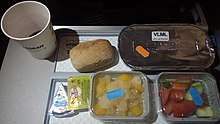蛋奶素主义
蛋奶素主义是一種不吃动物肉但會吃奶制品和蛋类等动物产品的素食主义。 [1][2]在西方世界,蛋奶素主义者是最常见的素食主義者。 [3][4]蛋奶素主义者主要吃水果、蔬菜、谷物、豆类、素肉、坚果、种子、大豆、奶酪、牛奶、酸奶和鸡蛋。 [5]
宗教[编辑]

在印度教和佛教等宗教中,大多数人要么是蛋奶素主义者,要么是奶素主义者。 [6]
对健康的影响[编辑]
与非素食饮食相比,蛋奶素主义饮食更有好處,[8]例如可以降低血壓[9]、低密度脂蛋白和总胆固醇,而且可能還能降低罹患癌症和心血管疾病的风险。 [10][11][12]
参考文献[编辑]
- ^ Puskar-Pasewicz, Margaret. (2010). Cultural Encyclopedia of Vegetarianism. Greenwood Publishing Group. p. 242. ISBN 978-0-313-37556-9
- ^ Johanna T. Dwyer. Vegetarian Diets. In Benjamin Caballero. (2013). Encyclopedia of Human Nutrition, Volume 4. Elsevier. pp. 316-322. ISBN 978-0-12-375083-9
- ^ Whorton, James. (2000). Vegetarianism (页面存档备份,存于互联网档案馆). In K. Kiple & K. Ornelas. The Cambridge World History of Food. Cambridge University Press. pp. 1553-1564. ISBN 978-1139058643
- ^ Vegetarian (Lacto-ovo vegetarian). [2021-09-27]. (原始内容存档于2016-12-11).
- ^ Healthy Guidelines for Lacto-Ovo Vegetarians. [2015-04-23]. (原始内容存档于2015-04-27).
- ^ Surveys studying food habits of Indians include: "Dairy and poultry sector growth in India" (页面存档备份,存于互联网档案馆), Quote: "An analysis of consumption data originating from National Sample Survey (NSS) shows that 42 percent of households are vegetarian, in that they never eat fish, meat or eggs. The remaining 58 percent of households are less strict vegetarians or non-vegetarians." "Indian consumer patterns" and "Agri reform in India" 互联网档案馆的存檔,存档日期2006-12-28.. Results indicate that Indians who eat meat do so infrequently with less than 30% consuming non-vegetarian foods regularly, although the reasons may be economical. 2.3 Growth and Concentration in India[6]. [November 17, 2016]. (原始内容存档于June 26, 2015).
- ^ A Position Statement on The Vegetarian Diet Adapted from the General Conference of Seventh-day Adventists Nutrition Council. SDADA. [2011-10-03]. (原始内容存档于2012-05-29).
- ^ Parker, Haley W; Vadiveloo, Maya K. Diet quality of vegetarian diets compared with nonvegetarian diets: a systematic review. Nutrition Reviews. 2019, 77 (3): 144–160 [2023-11-08]. PMID 30624697. doi:10.1093/nutrit/nuy067
 . (原始内容存档于2024-03-03).
. (原始内容存档于2024-03-03).
- ^ Gibbs J, Gaskin E, Ji C, Miller MA, Cappuccio FP. The effect of plant-based dietary patterns on blood pressure: a systematic review and meta-analysis of controlled intervention trials (PDF). Journal of Hypertension. 2021, 39 (1): 23–37 [2023-11-08]. PMID 33275398. S2CID 225483653. doi:10.1097/HJH.0000000000002604. (原始内容存档 (PDF)于2023-05-30).
- ^ Wang F, Zheng J, Yang B, Jiang J, Fu Y, Li D. Effects of Vegetarian Diets on Blood Lipids: A Systematic Review and Meta-Analysis of Randomized Controlled Trials. Journal of the American Heart Association. 2015, 4 (10): e002408. PMC 4845138
 . PMID 26508743. doi:10.1161/JAHA.115.002408.
. PMID 26508743. doi:10.1161/JAHA.115.002408.
- ^ Dybvik, J.S., Svendsen, M. & Aune, D. Vegetarian and vegan diets and the risk of cardiovascular disease, ischemic heart disease and stroke: a systematic review and meta-analysis of prospective cohort studies. European Journal of Nutrition. 2022, 62 (1): 51–69. PMC 9899747
 . PMID 36030329. S2CID 251866952. doi:10.1007/s00394-022-02942-8.
. PMID 36030329. S2CID 251866952. doi:10.1007/s00394-022-02942-8.
- ^ Oussalah A, Levy J, Berthezène C, Alpers DH, Guéant JL. Health outcomes associated with vegetarian diets: An umbrella review of systematic reviews and meta-analyses (PDF). Clinical Nutrition. 2020, 39 (11): 3283–3307. PMID 32204974. S2CID 213892045. doi:10.1016/j.clnu.2020.02.037.
